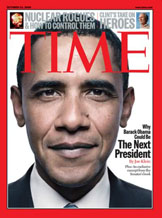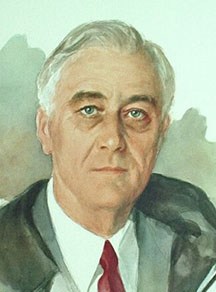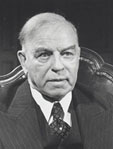Friday, 02 January 2009
 It was not easy to be cheerful when we saw headlines like: "Think 2008 was bad? Just wait, economists say" ; "Economists grim in their forecasts for 2009" ; and "2009 to be 'weakest year' since World War II." On the other hand, on the second-last day of the fateful old year we heard as well that the "Toronto stock market registered a triple-digit rise for a second straight session," and "New York indexes are also up sharply." Then again, in the midst of all the increasingly bleak economic news that finally was the unhappy hallmark of 2008, the United States actually did elect its first African American president! Bleak economic news itself holds out some hope that the latest dictatorship of the almighty dollar is waning. And this may help us remember what the English economist John Maynard Keynes prophesied in another fateful year of 1930: "I see us free, therefore, to return to some of the most sure and certain principles of religion and traditional virtue — that avarice is a vice ... and the love of money is detestable, that those walk most truly in the paths of virtue and sane wisdom who ... can teach us how to pluck the hour and the day virtuously and well ... the lilies of the field who toil not, neither do they spin." It was not easy to be cheerful when we saw headlines like: "Think 2008 was bad? Just wait, economists say" ; "Economists grim in their forecasts for 2009" ; and "2009 to be 'weakest year' since World War II." On the other hand, on the second-last day of the fateful old year we heard as well that the "Toronto stock market registered a triple-digit rise for a second straight session," and "New York indexes are also up sharply." Then again, in the midst of all the increasingly bleak economic news that finally was the unhappy hallmark of 2008, the United States actually did elect its first African American president! Bleak economic news itself holds out some hope that the latest dictatorship of the almighty dollar is waning. And this may help us remember what the English economist John Maynard Keynes prophesied in another fateful year of 1930: "I see us free, therefore, to return to some of the most sure and certain principles of religion and traditional virtue — that avarice is a vice ... and the love of money is detestable, that those walk most truly in the paths of virtue and sane wisdom who ... can teach us how to pluck the hour and the day virtuously and well ... the lilies of the field who toil not, neither do they spin."
Will Obama inevitably be a disappointment?
 Some are already saying that by the end of 2009 the bloom will be off the Obama rose — or whatever the more appropriate metaphor may be. Expectations for him are so high, and the problems he faces are so challenging, that he is bound to disappoint even or perhaps especially his most passionate supporters. Even before the year had properly begun, you could arguably see the start of all this in Frank Rich’s December 27, 2008 New York Times column, "You’re Likable Enough, Gay People." Some are already saying that by the end of 2009 the bloom will be off the Obama rose — or whatever the more appropriate metaphor may be. Expectations for him are so high, and the problems he faces are so challenging, that he is bound to disappoint even or perhaps especially his most passionate supporters. Even before the year had properly begun, you could arguably see the start of all this in Frank Rich’s December 27, 2008 New York Times column, "You’re Likable Enough, Gay People."
We are certainly hoping the prophets of gloom and doom here will prove untrue. Like others, we think history provides some evidence that they probably are.
Franklin Delano Roosevelt first came to office as President of the United States on March 4, 1933, at the height of the Great Depression. He never did altogether solve the economic troubles of the 1930s. That was an economic feat that only the Second World War proved able to pull off. But F.D.R. gave enough American voters enough hope to be elected president four times. (A unique political feat which ultimately prompted passage of the Twenty-second Amendment to the US Constitution in 1947, prescribing that: "No person shall be elected to the office of the President more than twice.")
 On a somewhat parallel plane, Thomas Friedman has recently urged in the New York Times that "Obama needs to lead us on a journey to rediscover, rebuild and reinvent our own backyard." On a somewhat parallel plane, Thomas Friedman has recently urged in the New York Times that "Obama needs to lead us on a journey to rediscover, rebuild and reinvent our own backyard."
And Naftali Bendavid has explained in the Wall Street Journal how: "Democrats hope that voters understand the severity of this recession and don't expect them to work miracles immediately ... They take some hope in that regard from the performance of President Franklin D. Roosevelt, to whom they are increasingly looking as a role model. Mr. Roosevelt didn't rapidly end the Great Depression, but voters supported him because he seemed to care so deeply, taking aggressive action and trying everything at his disposal."
The beginning of F.D.R.’s first inaugural address, on Saturday, March 4, 1933, still has some echoes that could ring aptly enough on January 20, 2009 too: "I am certain that my fellow Americans expect that on my induction into the Presidency I will address them with a candor and a decision which the present situation of our Nation impels. This is preeminently the time to speak the truth, the whole truth, frankly and boldly. Nor need we shrink from honestly facing conditions in our country today. This great Nation will endure as it has endured, will revive and will prosper. So, first of all, let me assert my firm belief that the only thing we have to fear is fear itself—nameless, unreasoning, unjustified terror which paralyzes needed efforts to convert retreat into advance. In every dark hour of our national life a leadership of frankness and vigor has met with that understanding and support of the people themselves which is essential to victory. I am convinced that you will again give that support to leadership in these critical days."
Might Stephen Harper really be the next Mackenzie King, who will dominate Canadian politics for a generation?
 We certainly hope not. And we’d argue that this looks less likely now than it may have looked, say six months ago. We certainly hope not. And we’d argue that this looks less likely now than it may have looked, say six months ago.
Mr. Harper’s great strength is still that, despite his Toronto birth and upbringing, he has managed to convince a great many (even non-hard-right-wing) voters in Western Canada that he is their champion in Ottawa. His great weakness seems to be that he still has not quite figured out who he really is, or even wants to be, in Canadian politics. The result is that he is finally unsteady on his feet. (And someone in this position, you would at least think, cannot be all that hard to knock over — if those doing the knocking have their act together themselves.)
Mr. Harper also lacks the great respect for the democratically elected Parliament that was among the great virtues of Canada’s still most successful (in the sense of longest-lived) prime minister, William Lyon Mackenzie King (1921–1926, 1926–1930, 1935–1948). Mr. Harper is the first Canadian prime minister who has so blatantly prorogued Parliament to avoid defeat in the elected House. And here’s hoping that he will also be the last head of government to venture into such dangerous territory for Canadian democratic values.
Where will things be on this front by the end of 2009? Of course, who really knows? But stay tuned for further thoughts from one of our regular counterweights contributors, about a potential new 2009 abstaining strategy for the Liberal Party of Canada — as a kind of strategic tit for tat to Mr. Harper’s dubious 2008 prorogation ...
Who really does and does not support auto sector bailout in Canada anyway?
 Opinion polls should of course never be taken all that seriously. The only polls that count are the ones on election day ... and so forth ... Opinion polls should of course never be taken all that seriously. The only polls that count are the ones on election day ... and so forth ...
On December 23, 2008 the National Post reported that: "A majority of Canadians believe it is unwise for the government to spend billions of dollars bailing out the collapsing domestic auto industry, because it does not guarantee the companies will stay alive for more than a few months and sets a precedent for other struggling sectors ... The finding is contained in a poll showing 58% of adults are against a new government aid package, with the strongest opposition coming from Alberta and the most support from Ontario, where the Canadian subsidiaries of Detroit automakers are located."
Well this is just what I would have expected, you might say. Except that just three days later, on December 26, the Canadian Press was reporting that: "A majority of Canadians are comfortable with billions of dollars in government loans for the ailing auto industry, a new poll suggests ... The Canadian Press Harris-Decima survey found that 56 per cent of respondents supported the notion of ‘proportional, repayable loans,’ while 33 per cent were opposed ... Ontario, the heart of Canada's auto sector, showed the most support, with 62 per cent in favour of the bailout and just 28 per cent opposed."
So ... don’t rush to any too firm conclusions about what may or may not happen in Canadian politics during the year 2009, based on what one particular opinion poll seems to be saying. A great many things just might happen, that actually go against the latest opinion poll. A pole, the great Western Canadian (born in Ontario) John George Diefenbaker told us long ago, is what dogs use to relieve themselves on, when a fire hydrant is not available.
Who will start to emerge as the new lilies of the field in 2009?
 To start with, our unhesitating answer is all the loyal and other readers of our counterweights website, dedicated to Canadian political debate and commentary on the open society, Ontario government, the United States, and the wider global village, etc, etc! To start with, our unhesitating answer is all the loyal and other readers of our counterweights website, dedicated to Canadian political debate and commentary on the open society, Ontario government, the United States, and the wider global village, etc, etc!
This may be a year full of much struggle for many of us, along with much great adventure and change you can believe in too. But struggle is what keeps us alive and interested in the future. Struggle is what finally helps us accomplish great things — even in such modest places as Canada, or the Ontario that has now started to become Canada’s richest have-not province, as well as its by far and away most populous province (maybe, and sort-of, assuming the price of oil does not drop as low as, say, $1.25 US). So, whatever may or may not happen, in any region of the world, here’s wishing a very happy and at least interesting new year to us all ...
 Similarly, we still have a little more time yet before we can really stop worrying about the economic problem, on John Maynard Keynes’s calculations of 1930. (His nirvana of "Economic Possibilities for Our Grandchildren" was set to arrive closer to, say, 2030.) Similarly, we still have a little more time yet before we can really stop worrying about the economic problem, on John Maynard Keynes’s calculations of 1930. (His nirvana of "Economic Possibilities for Our Grandchildren" was set to arrive closer to, say, 2030.)
But Keynes’s grandchildren are already among us. And this is as good a time as any to remind ourselves that "those walk most truly in the paths of virtue and sane wisdom who ... can teach us how to pluck the hour and the day virtuously and well ... the lilies of the field who toil not, neither do they spin." Already it is these people, we’d also submit, who can best lead us through the new struggles of our era today. And Barack Obama, for one, does indeed look like he could be among them — along with all our especially excellent counterweights readers (of course, of course) ... Only registered users can write comments.
Please login or register. Powered by AkoComment 1.0 beta 2!
|
